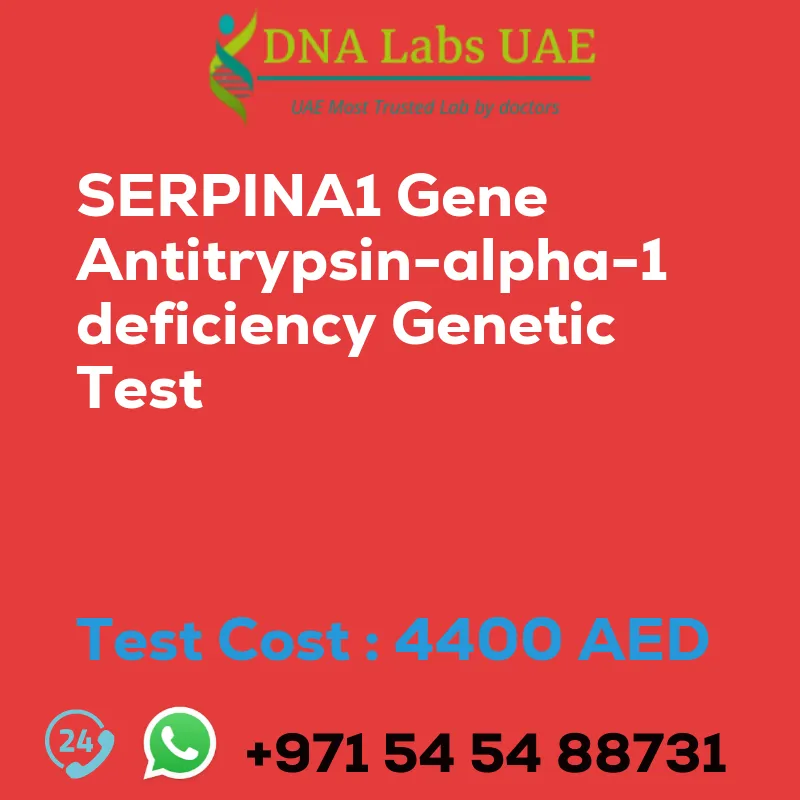SERPINA1 Gene Antitrypsin-alpha-1 Deficiency Genetic Test
Welcome to DNA Labs UAE, where we offer the SERPINA1 Gene Antitrypsin-alpha-1 Deficiency Genetic Test. This test is designed to detect mutations in the SERPINA1 gene, which is responsible for producing a protein called alpha-1 antitrypsin (AAT). A deficiency or dysfunction of AAT can lead to lung and liver diseases.
Test Components
The SERPINA1 Gene Antitrypsin-alpha-1 Deficiency Genetic Test includes the following components:
- NGS Technology
- Metabolic Disorders Test Type
- General Physician as the Doctor
- Genetics as the Test Department
Price
The cost of the SERPINA1 Gene Antitrypsin-alpha-1 Deficiency Genetic Test is 4400.0 AED.
Sample Condition
We accept the following sample conditions for this test:
- Blood
- Extracted DNA
- One drop of blood on an FTA Card
Report Delivery
Once the sample is received, the report will be delivered within 3 to 4 weeks.
Method
We use NGS (Next-Generation Sequencing) technology to analyze the DNA sequence of genes, including the SERPINA1 gene, to detect any mutations or variants associated with AATD.
Test Type
The SERPINA1 Gene Antitrypsin-alpha-1 Deficiency Genetic Test falls under the category of metabolic disorders.
Doctor
The test is conducted under the supervision of a General Physician.
Test Department
Our Genetics department handles the SERPINA1 Gene Antitrypsin-alpha-1 Deficiency Genetic Test.
Pre Test Information
Prior to the test, we require the clinical history of the patient who is undergoing the SERPINA1 Gene Antitrypsin-alpha-1 Deficiency NGS Genetic DNA Test. Additionally, a genetic counseling session will be conducted to draw a pedigree chart of family members affected by Antitrypsin-alpha-1 deficiency.
Test Details
The SERPINA1 gene is responsible for producing alpha-1 antitrypsin (AAT), which protects the lungs from damage caused by neutrophil elastase. A deficiency or dysfunction of AAT, caused by a mutation in the SERPINA1 gene, can lead to an increased risk of lung and liver diseases.
In the lungs, AAT deficiency allows neutrophil elastase to damage lung tissue, resulting in conditions such as chronic obstructive pulmonary disease (COPD) and emphysema. In the liver, abnormal accumulation of AAT can lead to liver disease, including cirrhosis.
NGS genetic testing is used to analyze the DNA sequence of genes, including SERPINA1, to detect mutations or variants associated with AATD. This type of genetic testing helps diagnose AATD, determine its severity, and identify carriers of the gene mutation. It is particularly useful for individuals with symptoms suggestive of lung or liver disease, those with a family history of AATD, and individuals at high risk, such as smokers.
The results of the genetic test guide treatment decisions and assist in developing a personalized management plan for the condition.
| Test Name | SERPINA1 Gene Antitrypsin-alpha-1 deficiency Genetic Test |
|---|---|
| Components | |
| Price | 4400.0 AED |
| Sample Condition | Blood or Extracted DNA or One drop Blood on FTA Card |
| Report Delivery | 3 to 4 Weeks |
| Method | NGS Technology |
| Test type | Metabolic Disorders |
| Doctor | General Physician |
| Test Department: | Genetics |
| Pre Test Information | Clinical History of Patient who is going for SERPINA1 Gene Antitrypsin-alpha-1 deficiency NGS Genetic DNA Test A Genetic Counselling session to draw a pedigree chart of family members affected with Antitrypsin-alpha-1 deficiency |
| Test Details |
The SERPINA1 gene is responsible for producing a protein called alpha-1 antitrypsin (AAT), which helps protect the lungs from damage caused by an enzyme called neutrophil elastase. Alpha-1 antitrypsin deficiency (AATD) is a genetic disorder that occurs when there is a mutation in the SERPINA1 gene, leading to a deficiency or dysfunction of AAT. AATD is associated with an increased risk of developing lung and liver diseases. In the lungs, the deficiency of AAT allows neutrophil elastase to cause damage to the lung tissue, leading to conditions such as chronic obstructive pulmonary disease (COPD) and emphysema. In the liver, the abnormal accumulation of AAT can lead to liver disease, such as cirrhosis. NGS (Next-Generation Sequencing) genetic testing is a method used to analyze the DNA sequence of genes, including the SERPINA1 gene, to detect any mutations or variants that may be associated with AATD. This type of genetic testing can help diagnose AATD, determine the severity of the condition, and identify individuals who may be carriers of the gene mutation. Genetic testing for AATD can be useful for individuals with symptoms suggestive of lung or liver disease, individuals with a family history of AATD, and individuals who are at high risk for developing AATD, such as smokers. The results of the genetic test can guide treatment decisions and help individuals and their healthcare providers develop a personalized management plan for their condition. |








